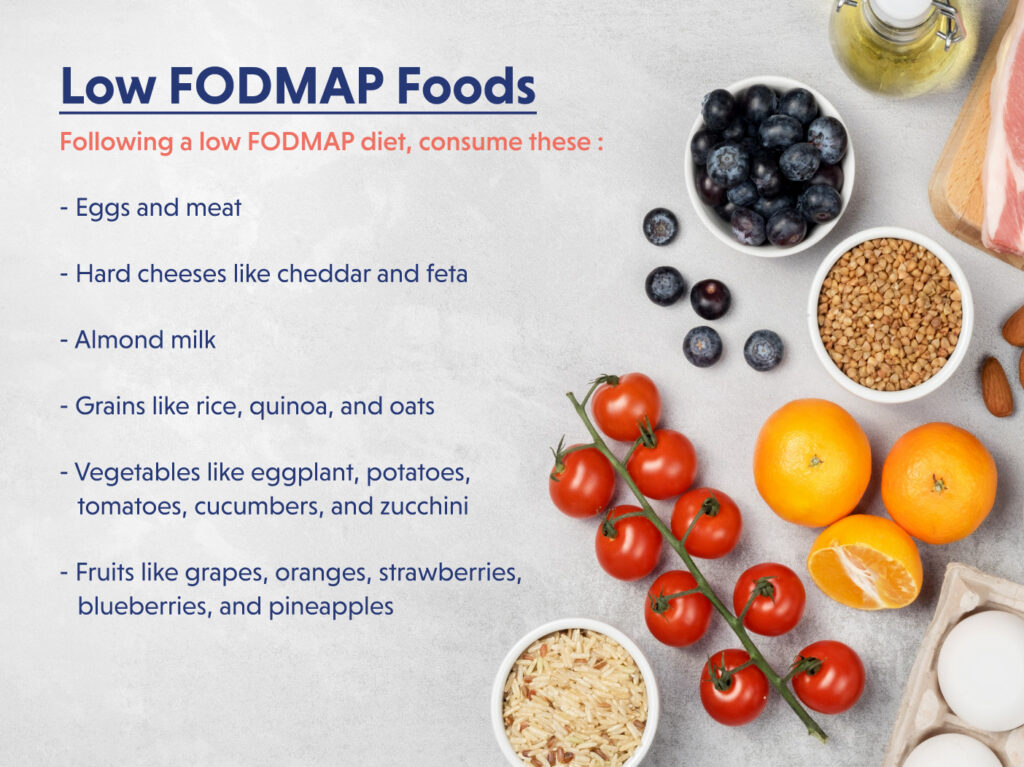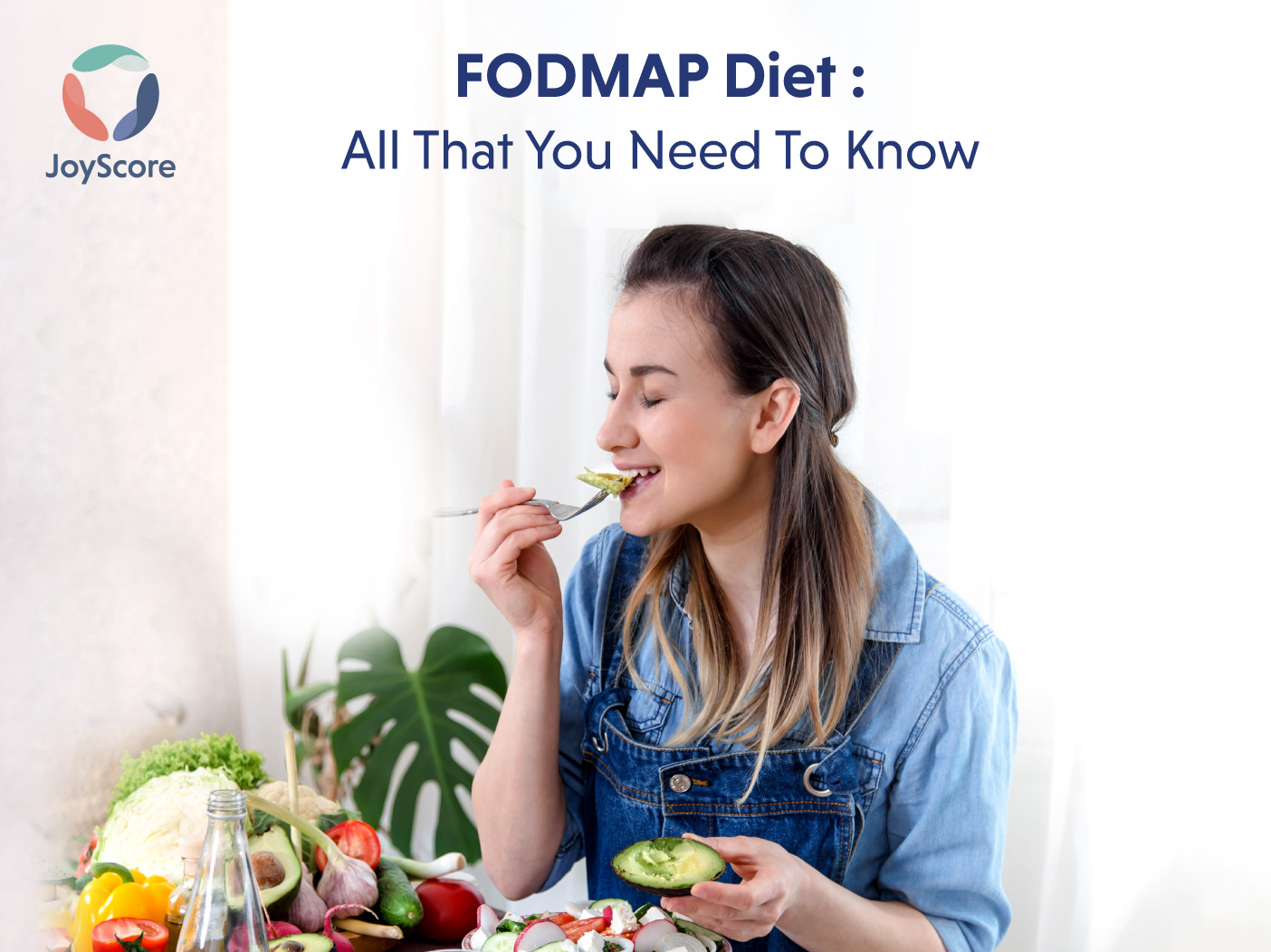FODMAP Diet- All That You Need To Know
FODMAP refers to fermentable oligosaccharides, disaccharides, monosaccharides, and polyols. For better understanding, the FODMAP diet includes foods that contain short-chain carbohydrates.
Short-chain carbohydrates are carbohydrates that contain 3-10 sugar molecules.
These foods are poorly absorbed in the small intestine and are capable of drawing water into your intestine. Additionally, they get fermented by the bacteria present in the colon. Hence, these types of foods can irritate some individuals’ guts.
A Low FODMAP diet refers to a diet containing foods low in fermentable sugars. For most, these foods, when taken in moderation, do not cause any problems. However, this type of diet should be followed only after a doctor’s consultation.
A Low FODMAP diet has been mainly designed for people suffering from serious digestive disorders. Two diseases that benefit from following a FODMAP diet are irritable bowel syndrome (IBS) and small intestinal bacterial overgrowth (SIBO).
The better recovery is seen in these two diseases when diet changes accompany certain medications and stress management.
Studies had shown that about 86% of symptoms are reduced in patients with IBS and SIBO when they followed a low FODMAP diet.
This type of diet helps to identify what foods are troublesome and may aggravate your symptoms. Let us delve a little deeper into IBS and SIBO.
- Irritable bowel syndrome (IBS)

- IBS is a common syndrome of the digestive system.
- In this disease, the symptoms come and go over time, but they may also last for a few days, weeks, or months.
- Common symptoms the patient suffers from are stomach cramps, bloating, constipation, and diarrhea.
- It can sometimes become a lifelong problem.
- There is no cure, but diet modification and medicines can control the symptoms.
- Small intestine bacterial outgrowth (SIBO)
- SIBO is a condition that occurs when there is an abnormal increase in the overall bacterial population in the intestine.
- This problem is often a complication of stomach surgeries or the result of some underlying disease.
- The symptoms of SIBO include loss of appetite, abdominal pain, nausea, bloating, diarrhea, unintentional weight loss, and malnutrition.
- SIBO must not be left untreated for long as it may complicate the symptoms. Further, it may lead to poor absorption of nutrients, vitamin deficiencies, kidney stones, etc.
- Other than the course of antibiotics, following a particular diet plan also becomes essential. So, a low FODMAP diet plays an important role to alleviate the symptoms.
Following a FODMAP DIET IS A 3-STEP PROCESS.
- Stop eating certain foods.
You need to restrict the consumption of high FODMAP foods for at least 4-8 weeks. However, these foods cannot be avoided completely in the long term as they are also important for your gut health.
Studies have shown an improvement in the symptoms of certain diseases in about 75% of people who followed this diet within the first six weeks.
The next step is the slow reintroduction of high FODMAP foods
The duration of this process varies from 6-10 weeks, as reintroducing these foods into your diet has to go slow.
To understand the tolerance of one’s digestive system, the process involves testing small amounts of specific foods one by one for three days. Also, waiting for at least 2-3 days is recommended before testing the next food item.
This process not only helps to identify which type of FODMAP foods you can tolerate but also establishes an understanding of what amount you can intake.
- Modify your diet
After knowing the types and amount of FODMAPs your system can digest, you need to make a new diet plan. It will help you reintroduce high FODMAP foods as per your tolerance levels.
Side effects of the FODMAP diet
If you are eating a lot of FODMAP-rich foods, you may experience some signs and symptoms due to poor digestion of certain carbohydrates. As a result, some symptoms that you may have:
- Cramping
- Diarrhea
- Constipation
- Stomach bloating
- Gas and flatulence
- Vomiting
High FODMAP foods to be avoided
To ease the digestive symptoms of IBS and SIBO, a list of food items must be avoided when following a low FODMAP diet.
- Dairy-based products like yogurt and ice cream
- Wheat-based products like cereals, bread, and crackers
- Beans and lentils
- Some vegetables like asparagus, cauliflower, onions, and garlic
- Some fruits like apples, cherries, pears, and peaches
- Nuts including cashews and pistachios
- Sweeteners and artificial sweeteners
Low FODMAP foods

Here is a whole list of food items that can be consumed when following a low FODMAP diet, as these do not irritate your gut.
- Eggs and meat
- Hard cheeses like cheddar and feta
- Almond milk
- Grains like rice, quinoa, and oats
- Vegetables like eggplant, potatoes, tomatoes, cucumbers, and zucchini
- Fruits like grapes, oranges, strawberries, blueberries, and pineapples.
- However, a low FODMAP diet can sometimes come with a few side effects too.
- Side effects of a low FODMAP diet
There are always some risks involved when we follow a diet without medical supervision or continue it for too long. Remember, a healthy body requires diverse meals.
Some common side effects of following a prolonged low FODMAP diet are:
- Imbalance of gut microbiota
A healthy gut depends upon the trillions of good microbes living inside it. Therefore, restricting a lot of FODMAP foods for too long will leave nothing for the gut microbes to feed on. This will ultimately affect the composition of your gut microbiota.
- Nutritional deficiencies
When we go through the list of food items we need to avoid during a low FODMAP diet, it becomes obvious that a lot of nutrient-rich foods are being restricted. Thus, it is not advisable to risk the development of nutritional inadequacies or full-blown deficiencies.
- Food Anxiety

If one constantly worries about the foods one can eat or not eat, it can lead to a lot of stress. This can enhance anxieties related to IBS or SIBO in the long run.
- Unsafe for people with low weight
A Low FODMAP diet is not meant for weight loss, but as you tend to eliminate many food items, you tend to lose weight. Therefore, it may become dangerous to people with low weight.
CONCLUSION
Following a low FODMAP diet has proved to be a boon for people suffering from diseases like IBS and SIBO. It not only assists in treating the symptoms but also helps them psychologically.
These patients report a reduced quality of life associated with severe digestive symptoms. Their social interactions and work performance suffer. Hence, following a low FODMAP diet helps reduce fatigue, depression, and stress.
Get more tips on nutrition by downloading the JOYSCORE APP to boost your happiness and vitality.
Download the Joyscore app Now!
Download on the Appstore
Get it on Google Play



